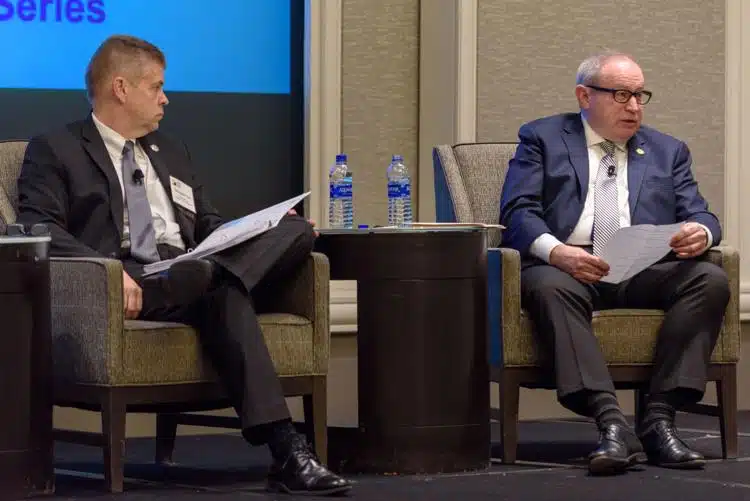Virginia’s 2019 legislative session largely was drowned out by the scandals of the statewide officers, but accomplishments included record deals with Amazon and Micron Technologies bringing new economic development to Northern Virginia, along with pay raises for educators across the state.
Two longtime delegates discussed how state leaders handled the legislative session at a Greater Reston Chamber of Commerce event March 13 at the Hyatt Regency in Reston.
Stephen Farnsworth, professor of political science and international affairs at the University of Mary Washington and director of the Center for Leadership and Media Studies, gave a legislative overview and moderated a panel discussion with House Speaker Kirk Cox, R-66th District; and House Deputy Minority Leader Del. Mark Sickles, D-43rd District.
Amid the legislative session, Gov. Ralph Northam, Lt. Gov. Justin Fairfax and Attorney General Mark Herring were embroiled in controversies.
But the General Assembly continued to work through the short legislative session that ended Feb. 23. State legislators worked diligently to update state tax law in response to changes at the federal level, and they also passed legislation for Amazon, Farnsworth said.
On Feb. 5, Northam signed legislation creating the financial incentives expected to help Amazon bring more than 25,000 new jobs to the state. The legislation passed the Senate 35-5 and passed the House 83-16.
If Amazon meets its goals on job creation, Virginia will pay the tech company up to $550 million in total from fiscal 2024 through 2034 and beyond. If the company brings an additional 12,850 new, full-time jobs, Virginia will pay the company another $200 million.
Cox said state legislators passed $1 billion in tax relief for Virginians.
“I thought this was the best budget,” Cox said.
Cox, who is a retired public school teacher, also touted the state’s 5 percent salary increase for teachers.
The pay raise for teachers, guidance counselors, librarians, instructional aides, assistant principals and principals is set to go into effect over the next two fiscal years, starting with fiscal year 2020, which starts July 1.
Local school divisions must pay a total of 3 percent pay increase over fiscal 2020 and 2021 in order to receive state funding that will cover a 5 percent pay raise over those two fiscal years. Starting Jan. 1, 2020, the state will provide a 2 percent pay increase for local school divisions that provide the local match. To qualify for the rest of the state funding, local school divisions must provide another 1 percent pay increase for fiscal 2021.
This November, the 40 Senate and 100 House seats will be on the ballot. Currently Republicans hold a slim majorities both in the House (51-49) and in the Senate (21-19).
Mark Ingrao, Chamber president and CEO, said the state’s tax legislation is good for businesses.
Ingrao said he was happy state legislators passed laws that allow localities and developers to talk about the effects of rezoning applications. The new law does not prohibit a rezoning applicant and the locality from discussing potential impacts of residential development.
The legislature also approved incentives for Micron Technology to expand its facility in Manassas. The legislation stipulates that if Micron invests at least $2.98 billion in its facility and creates and maintains at least 1,106 new jobs with an average annual wage of at least $92,000, Virginia will allocate $50 million in fiscal 2020 and another $20 million in fiscal 2021.
Ingrao said the growing business community is a good thing for Northern Virginia.
“If a community is not growing, it’s dying,” Ingrao said.
The Reston Chamber organized the event, with support from the chambers of commerce for Dulles Regional, Loudoun County, Greater McLean and Tysons Regional, Northern Virginia Technology Council and Prince William.

